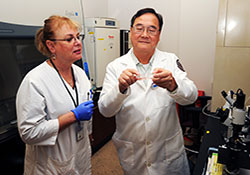Office of Research & Development |
 |

VA Research Currents archive
Posted December 16, 2013
Researchers at VA and Loma Linda University in Southern California have discovered a way to reprogram adult blood cells into stem cells. The research offers hope for patients suffering from a variety of diseases.
Stem cells have long been seen as the cornerstone of regenerative medicine. Their ability to reproduce forever and be reprogrammed into an assortment of tissues separates them from other cells. Early research showed promise, but the cells are hard to come by. Fetal stem cells raise ethical concerns, and there is more demand than umbilical cord blood alone can meet.
This study is the first to report that blood cells drawn from adults can be reliably reprogrammed into multipotent stem cells that can be made into any number of other types of cells.
According to Dr. Xia-Bing Zhang, lead author of the study, human-induced mesenchymal stem cells, or iMSCs, are found in the blood and can be grown into muscle fibers, bone, cartilage, and more. The tissue can then be used to rebuild injured bones or regenerate organs.
One challenge is that it takes time to develop iMSCs. Doctors have to harvest them from bone marrow or connective tissue during surgery. Even then there are problems. "These cells have shown potential for clinical therapies, but often insufficient amount of cells or subpar regenerative potency of the harvested cells hampers their widespread application," said VA researcher Dr. William Lau, who worked on the study.
Another option is to grow the cells from scratch using skin cells taken during biopsies. But this process is difficult and can take months. In some cases, tumors can develop as a result of contamination.

Dr. William Lau, seen here with research technician Virginia Stiffel, is a research biologist with VA and Loma Linda University. (Photo by Christian Fernandez)
Zhang's team instead found a way to develop iMSCs from adult blood by using a single protein. The cells were converted using OCT4, a protein involved in stem cell renewal.
"The new development—using patient's own blood cells—considerably simplifies the conventional approaches," said Lau.
Sixteen percent of the OCT4-converted cells turned into iMSCs in two weeks. This ability to reprogram blood cells "has important implications for regenerative medicine," wrote the authors.
The researchers hope the shortened development time will lead to faster responses to medical needs. An added benefit is that patients' own cells can be used to treat their illness. This kind of targeted medicine is particularly useful in ensuring patients' bodies don't reject donated organs.
Lau believes the research will lead to further developments in adult-derived iMSCs and eventually impact treatment for Veterans, particularly those suffering skeletal injuries.
Cell Research, May 2013